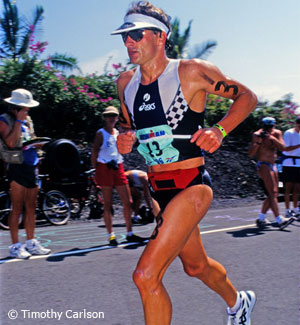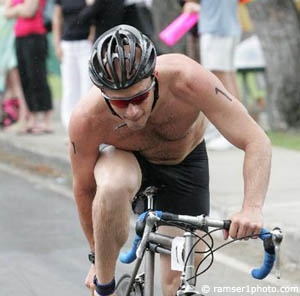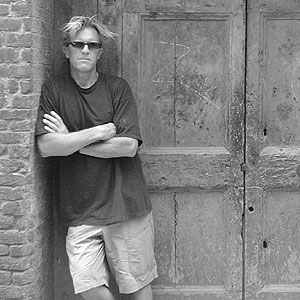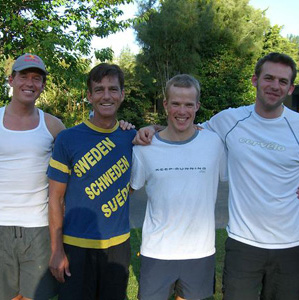The athlete Jimmy Riccitello
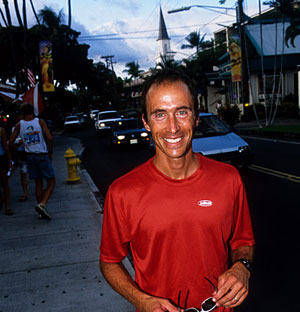
Many know Jimmy Riccitello as an Ironman cycling official and a coach for multisports.com, but he also has a very impressive athletic resume. He is an XTERRA World Champion, won St. Croix twice, plus he also won 70.3 Buffalo Springs and several USTS events. He shared some of his stories with slowtwitch.
ST: Jimmy, even though you still look super athletic now, I think many folks don’t know much if anything about your professional triathlon background. Or am I wrong here?
Jimmy: In the old days I used to get freaked out by how studly some of my peers looked. I used to tell my dad, “Jeez – look at the muscles on that dude.” My dad would tell me, “Don’t worry. Everyone looks good when they’re warming up.”
I most definitely look fitter than I actually am. (Genetics I guess). Now I’m “that guy.” I can show up to a race looking fast – wearing all the fancy looking outfits. I can line up on the starting line and haul ass for the first 5 minutes of the race, pull up lame, and then talk about how well I would have done if I didn’t get a cramp in my calf. Anyway, you’re right: not too many people know much about my background as a triathlete. It certainly doesn’t hurt my feelings and sometimes it works in my favor.
ST: But I guess most of the Pros you are working with, know all about you?
Jimmy: Most of the pros I deal with regarding officiating, know that I was once “one of them.” I think that helps in terms of the pros respecting my position. In other words, I have been there. I understand what they are going through. I understand the dynamics of racing, and they know that. I think Ironman realized the benefits of having a former athlete look after its participants. Of course, not everyone is pleased when they receive a penalty, but more often than not, we’re given the benefit of the doubt.
I have to say that officiating is not my favorite thing in the world to do. I do not like being the “bad guy,” but I look at it as a duty, giving back to the sport, and I hope that my participation will encourage others to “put their money where their mouth is” and become part of the solution. When I was racing, I wished for officials who understood the athlete’s point of view, had an intimate knowledge of the dynamics of racing, would focus on issues that would directly affect the outcome of the race, and who would make the calls when needed. I try to be this type of official. I’m sure there are a few who feel I fail in one or more of these areas, but I take solace in the fact that my intentions are sincere. I want what they want: as fair and safe a race as possible.
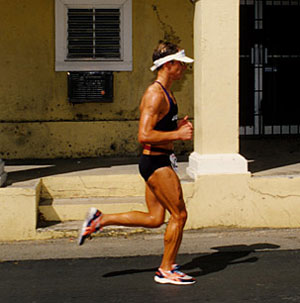
ST: Some of our readers are newer to the sport, so please take us back to the time when you got started in triathlon.
Jimmy: I got my start in the sport through luck, the pursuit of fitness, and the love of competition. I started as a high school swimmer, which may come as a surprise to those who used to race with me, as I was not a very good swimmer. When asked about my swimming background, I often say that I could beat some of the women swimmers on my high school swim team. No offense meant to women, of course.
My high school swim coach was a cyclist. He rode everywhere and introduced me to cycling. Cycling was freedom to me, back then. I didn’t have a car and cycling was my sole means of transportation. I rode to and from school and to and from swim practice every day. This meant riding to 5:15 AM workout three days a week in high school – without lights – uphill both ways. I fell in love with cycling and started riding to local destinations whenever I had spare time.
My luck continued in college. I took a course taught by George Dallum. I soon discovered that George was one of the top US triathletes. That aside, George became the first Head Coach for USAT. George was the fittest person I had every met. He could also eat faster and eat more than any person I ever met. He was also the only person I’ve met in my life thus far, including my two children, who is a bigger slob than I am. Needless to say, I was very impressed with him and embarrassingly, I wanted to be like him. I began jogging so that I could do triathlons and hopefully become as fit as George.
Tucson and the University of Arizona had a few very good triathletes back then and they were all very encouraging. Chief among them was Paul Huddle. He was the best, at the time. I guess I wanted to be like him, too. Apparently I was pretty impressionable back then. It’s a good thing I my friends weren’t hoodlums. Anyway, I started racing literally every weekend, in either a triathlon or a bike race and that’s how I got started.
ST: What would you consider your most important result of your career?
Jimmy: I suppose the most important result of my career would be the third race I ever did – the 1985 Bud Light USTS Phoenix Triathlon. Back then anyone could enter the pro division. I entered the pro division at Paul Huddle and John Clothier’s urging. Long story short – I finished second to Scott Tinley. I’ll never forget the feelings I had, that day. I honestly had no idea I could do well in a race of that caliber. Four miles into the bike ride, I was in first place, but I had no idea I was in first until I reached the bike turn-around and realized I was the first one to start heading back. I rode alone in first until Tinley approached at mile nineteen. First a few police motorcycles passed, then a big flat-bed truck full of photographers, and then Tinley. It was an awesome site and one I wanted for myself someday. No one took my photograph as they honestly thought I was some tourist riding through the desert in a Speedo. Tinley noticed, though. After the race he talked to me, which was very cool. He eventually hooked me up with many of his sponsors. He gave me a piece of advice that I still follow today, unless I can get a 0% loan – and that was: “Always pay cash.” He told me triathlon is fickle and can be fleeting. Illness or injury can be a day away. He told me to use the money I won to buy a ticket to the next stop in the Bud Light USTS Series. He told me to appreciate anything anyone ever gives me as a result of my being an athlete. All of this advice served me well.
That race instilled in me the notion that hard work pays off and that dreams and desire really do make difference. It gave me the courage to take a chance and make a life out of sport. Thank goodness Tinley’s advice stuck with me, too, because we know the financial reward triathlon provides is not the greatest. Nevertheless, everything I have came from triathlon. So even though the material rewards have been modest, my outlook on life, work ethic, and my network of friends, has been shaped by our sport.
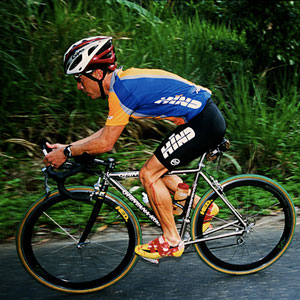
ST: Looking at the pros now, do you think it is similar for them as it was for you in terms of training and racing?
Jimmy: Things are starting to look up for professional triathletes, but I feel it’s harder to make a living as a triathlete today, than it was for me. Part of this is due to the fact that there are more professional triathletes and more good professional triathletes out there than in my era. But I think the main reason it is more difficult to make a living at the sport is that potential sponsors started spending their dollars on events and Federations instead of professional triathletes.
I grew up with the salad days of triathlon. There were races every weekend, and most featured $15-30k of prize money. There were a couple of series with bonus pools that were very lucrative. The sponsors were plentiful, and they spent money on the athletes. When triathlon became an Olympic sport I noticed a change. With the Olympics, it became more economical and less risky for sponsors to invest in events and Federations such as USAT. Why spend money on an athlete when there is no guarantee that athlete will make the Olympic Team. It was less expensive to sponsor USAT and be guaranteed the Olympic Team vs. sponsoring an athlete who was not guaranteed to make the team. In essence, we had to compete with USAT for sponsors. To make matters worse, the ITU World Cup was not a good way to make a living in my era. Races were expensive to get to and it was very hard to represent your sponsors in a way that was contractually mandated, due to uniform restrictions put in place by the ITU. I suppose I was somewhat jaded by the fact that I pretty much sucked at draft legal triathlon – but things did get more difficult, financially, at that time.
Now that there is an increase in viable world wide race series such as the Ironman series (70.3 and Ironman distance) and others – not to mention the increased media coverage– things are swinging back around. I’m sure the Olympics are starting to help increase the notion that triathlon is a “real” sport, but they come only once every four years, and there can be only one gold medalist. The “regular” triathlons, which feature pros and age-groupers, are driving the sport right now. My hope is that the World Cup will start to garner more interest from the general public and age-group triathletes, because it’s an amazing series with amazing triathletes. I’m sure that many of the future stars of Ironman will come from the World Cup.
ST: What about the new bike and swimming technology?
Jimmy: Bikes have become lighter and more expensive, and the frames have become more swoopy and aero, but there’s not much out there that makes us ride any faster than we rode in the 80s. Once you plop a person on top of an aero frame, the difference as compared to a round tube frame are insignificant for most of us. I spend a lot of time in the wind tunnel and I’ve learned that a good bike fit, aero bars, a disc wheel on the back, and a Hed trispoke on the front are all you need to ride as fast as the next person. These items have all been around since the old days.
I suppose the aero helmet is new and definitely helpful – despite its dorkiness. And clothes have gotten a little better, although it’s hard to beat bare skin and a Speedo – not much flapping in the wind with that outfit.
Speedsuits in the swim are definitely faster than the old speedo, but I feel they’re not right, nor are they necessary for triathlon. They’re ugly as hell for one thing. I’d much rather see skin than a full-body speedsuit. I also feel the speed-suits help weaker swimmers more than they help good swimmers. This is the main reason I don’t like them for triathlon. They narrow the gap and diminish the swim portion of the race. I dislike wetsuits for the same reason. And remember that I’m a relatively crappy swimmer.
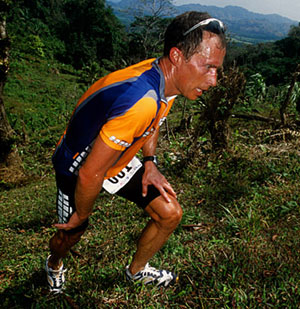
ST: How much do you train now?
Jimmy: Not much. People never believe me when I say this, but it’s true. I keep active, but I really have not trained much in the past 5 years. I have a week or two here and there when I “go pro,” but for the most part it’s simply a matter of getting it in when I can. Last week I had a client in town, so I rode my bike every day – probably 16 hours worth. But I didn’t run a step. This week I ran 4 miles on Monday and Tuesday, but rest of the week my only exercise was playing with the kids. As for swimming; I bet I haven’t swum 30 days in the last 5 years.
I miss it and I had serious plans to start a consistent training plan this year, but it’s almost April and I haven’t been very good with it. That said – I’ve probably done more training this year than I’ve done in a long while. My “regular routine” includes watching what I eat, sporadic strength work, fairly regular core work, 2-4 days per week of running at 4-5 miles per run, and the Shootout (3-4 hours of hard group riding) on some Saturdays. Family, Multisports.com and Ironman keep me pretty busy. However, next year both kids will be in school and that will free up a lot of time. So I figure next year I’ll have much more time to play again.
ST: Maybe you can give us an idea how much you trained when you were racing as a Pro?
Jimmy: I trained a lot. We all did. There were 15 years where I bet I averaged 20-30k of swimming, 300-400 miles per week on the bike, and 35-60 miles per week of running. Although I paid my bills from triathlon, it was a lifestyle more than a job, and I made the most of it. In my mind, what could be better than getting paid to exercise all day? It was a lifestyle I did not want to loose. I figured the more I trained, the less likely I was to loose what I had.
ST: Talk about your race nutrition then?
Jimmy: You have to consider that I was mainly an Olympic distance guy. We kept it simple. Water, sugar and salt were about all we were concerned with. Solid foods were never a good option, considering the intensity of the effort put forth. Mike Pigg and I used to take salt and sugar packets from the breakfast buffet, and dump them in our water bottles and we were good to go. Each of us had our special mixture. If it was especially hot and humid, we’d carry some extra salt packets during the race and simply pop a packet or two into our mouths during the race, chew on it to get the salt out and then spit out the paper. It worked great. I’ve seen many products come and go over the years, but the staple stuff is still around: Gatorade and Coke – which is, as we all know, water, sugar, and salt … with a little food coloring thrown in for good measure.
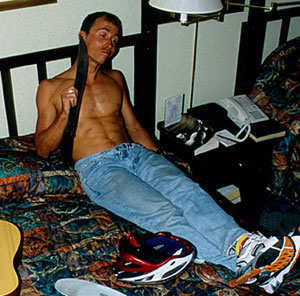
ST: Would you want your kids to become Pro triathletes?
Jimmy: I want my kids to enjoy exercising. My greatest fear is that something I do or say will cause them to resent exercise. I love exercising and competing, but I don’t know what my parents did to instill this in me. I’m searching for answers, but so far my kids love exercising and I don’t have to push them out the door. It’s quite the opposite, in fact. At my kid’s insistence, I’ve become quite the basket ball player – especially when the hoop is at “kids” height. I can dunk. I can do some mean tricks on the trampoline and haven’t hurt myself yet. I can haul ass on a razor scooter. I can jump rope like Ali. I can hoola-hoop for 5’ straight. I’ve even done a few laps on the bmx course. As for the kids becoming triathletes: the interesting thing is that Madeline has never seen me race, and Matthew was too young to realize what was going on when I competed in my last few events. They know me as a daddy who runs, rides his bike, and occasionally swims some laps. They’ve seen me work at a few races and know that I “teach” people how to swim, bike, and run, but I have no idea where this info will steer them. If they should some day Google daddy and decide, based on info that they read, that triathlon is a cool sport – I’ll back them up 100%.
ST: Do you follow any other sports?
Jimmy: I love swimming and running because of the solo nature. Ultimately it’s just you against the course and the clock. This is also why I love triathlon. The mental fortitude required to become world class in these sports has always impressed and intrigued me. I love the tactical aspect of cycling and how it meshes with the ultimate fact that the individual tests – the time trials and hill climbs – usually play the biggest part in the final outcome. I love moto cross. I know a few pro moto crossers and I’ve never seen anyone train as intensely as they do. And this is not even taking into consideration the size of the cajones required to do the things they do on a motorcycle, nor the skills required. I love all college sports. The sincere team camaraderie makes me feel good.
ST: Can you share with us some of your food likes and dislikes?
Jimmy: I love spicy food. I’m talking about severe stomach distress causing, spicy. I love garlic. I love Italian food. My grandma ran Riccitello’s Italian restaurant in Schenectady, NY. My father’s house was above the restaurant. Cooking was and is a big part of my life. I wish I were a better cook, though. Riccitello’s is now run by my dad’s brother, Uncle Lewis. If you have a long layover in Albany, on your way to or from Ironman Lake Placid, stop in for some tasty chow. It’s a few minutes drive from the airport. They’ll feed you well.
I don’t like cotton candy. It creeps me out and it’s too sticky. I don’t like fried chicken. My dad used to own a fried chicken place – enough said. I don’t like croissants. It’s too hard to say the word properly. I will never eat a hot dog. I have trouble even saying the word “hot dog.” I love mussels, but I had a terrible allergic reaction to them. My throat closed up, I couldn’t breathe, and I was covered with huge welts. I want to try them again, but I’m too scared to make myself eat one.
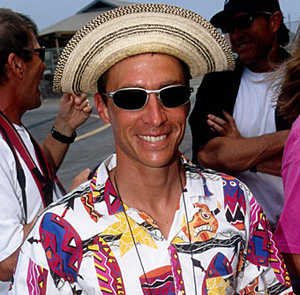
ST: What music do you like?
Jimmy: I like all music, but Dylan is my favorite. He writes great songs and I don’t mind his singing. Currently I’ve been listening to John Mayer, Jack Johnson, Jackson Browne, and The Raconteurs. I guess I’m in a “J” phase since Jack White fronts the Raconteurs. Their “Consolers of the Lonely” is one of the coolest albums I’ve listened to in a long time.
ST: What was the last book you read?
Jimmy: Woody Guthrie: A Life, by Joe Klein, was the last book I finished. I usually read 3 or 4 books at a time, choosing each night, depending on my mood. Right now I’m reading: Again to Carthage, by John L. Parker. I never read Once A Runner, but I will, once I’m done with Again to Carthage. I’m almost done with Chronicles, Volume 1, by Bob Dylan. I love the way he writes about his life. And if you haven’t caught Theme Time Radio with Bob Dylan on XM Radio, you’re missing something special.
When I’m on the crapper I have my some short, non-hemorrhoid producing books. My son got me hooked on Diary Of A Wimpy Kid, by Jeff Kinney – very clever and funny. Of course there are the requisite magazines: Rolling Stone, Esquire (for my man side), Vanity Fair (for my Woman side), Runner’s World.
ST: Where do you see yourself in 5 years?
Jimmy: That’s an interesting question and one I never considered until the birth of my son. I was never one to think much farther ahead than the next workout. I’m sure most of my life in 5 years will revolve around my family. The kids are so fun, and funny, and frustrating, and challenging – all in a good way. It’s amazing how much pleasure I get from all the little accomplishments that seem to happen every day. Every day there is something new. The other day my son told me a joke for the first time. Lately he’s been into making up his own jokes. They suck, but the fact that he thinks they’re funny, cracks me up.
I want to spend some time becoming a better coach because that seems to be my current passion. It’s definitely filled a void for me. I now live vicariously, and it’s surprisingly satisfying. It’s kind of like having kids – on a much less intimate level, of course. I become involved enough with my clients that I derive a great deal of pleasure from their accomplishments. And the beauty of triathlon is that there’s lots of room for accomplishments.
ST: Is there anything else we should know about you?
Jimmy: I hate that Starbucks is not about the coffee anymore. Today I heard a lady order a non-fat, upside down, caramel frappuchino – stirred. WTF?
I would penalize my mother if I caught her drafting.
I have pristine toes.
I think that leaf/dirt blowers should be illegal. Doesn’t anybody rake or sweep anymore?
I’m not loosing my hair. I simply wear it shorter than I used to.
I’ve chewed tobacco for most of my life, but I’m not hooked.
I’ve never been drunk.
I can snort a spaghetti strand up my nose and make it come out of my mouth.
I rarely sleep more than 6 hours a night, and I never nap.
Is that too much?
Video of Jimmy Riccitello's XTERRA Hall of Fame inductation
All images © Timothy Carlson / Video thanks to XTERRA


